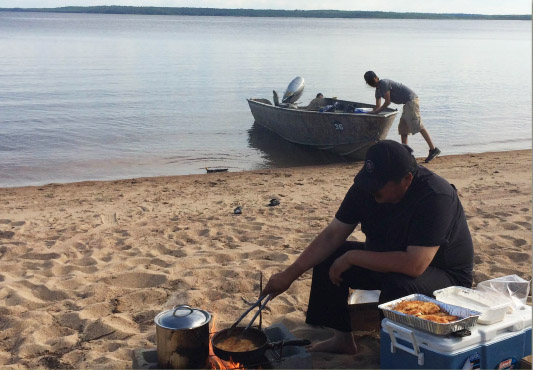
Wilderness Preparation & Guidance Program
Youth Engagement Fund
When speaking to A. Thomas Hester, one gets the sense that he feels fortunate. When he was young, he would spend his summers with his grandparents. With them, he learned about fishing, cleaning and preserving fish. From his Grandfather, he learned how to manoeuver a canoe, set up fishnets, and check them. From his uncles, he learned how to set up traps for groundhogs. He also learned to do things a certain way, to live according to the seasons, like Cree people used to do: fish in summer and early fall. When he was old enough, he could do it with confidence, by himself.
This type of life experience gave Thomas, who served on Youth Council for a number of years, as Youth Chief as well, and who is currently Deputy Chief of Waskaganish, the idea to have a project reflecting how Crees carry out traditional practices according to the seasons, so that young people could learn and live more like their ancestors did.
When the grandfathers or fathers would set where to hunt or fish for the season, they would prepare in advance, and get their gear ready. As soon as they knew where they were going, they would have everything they needed. The goal of the Wilderness Preparation and Guidance Program is for young people to learn and practice traditional pursuit. It is also to provide positive experiences and outlets for youth who may otherwise be engaged in negative activities in the communities or their lives. Through the learning, there is a sense of belonging to a community, a culture, the land and it creates value and confidence in those that participate.
This program is about pairing young people who want to learn – for example fishing, waterfowl hunting, moose, bear or beaver hunting – with an experienced hunter, trapper or fisherman who is willing to help and guide, and mentor, the young applicant. It is about passing down knowledge of what they know, first by preparing and understanding, then by practicing things like scouting the area, setting up traps, checking the traps, trapping the animal, and how to butcher, prepare, smoke the meat while respecting the prey.
The Wilderness Preparation and Guidance Program raised much interest, both from the applicants, who are mainly between 10 and 17 year old, and the mentors. Older applicants can also participate in more rigorous activities, such as bear trapping. Depending on the season, the activities vary, as traditionally, Cree people live according to the seasons.
Another objective is to strengthen, promote and preserve Cree culture and to live by the values and traditions of the Crees, using hand-on experiences. The youth are given the opportunity to live the traditions that their ancestors have practiced for thousands of years. By these demonstrations and then practices, the youth will preserve the language. The words used by hunters and trappers out on the land are either to describe a place or what is used for certain practices, such as fishing, trees and tools. These are terms that may not be heard in day to day life in the community.
Thomas takes pride in the fact he received much support both from the Waskaganish Council and the population. When the Traditional Pursuit program was advertised on the radio, an Elder told Thomas: “I listened to you on the radio. I really wanted to hear what you were doing. I began to understand the project and what you want to do. I was moved by the words you said and your desire to hold on to the knowledge. I too want to pass on my knowledge and experience before I go!”.
Thomas is satisfied with the first year. The numbers of outing is still limited, yet participants, both trainees and mentors, are very happy so far. One participant went out for the first time for bear trapping with a hunter. They harvested a bear and it was a tremendous experience. He and his family will remember it for a long time.
Thomas also shared his hopes that participants will learn about themselves and find themselves. In doing so, they will gain confidence and respect themselves. Through self-love, they will respect even more the land, their surroundings and animals. Exactly like their Cree ancestors did.


